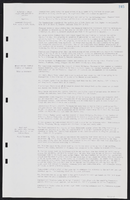Search the Special Collections and Archives Portal
Search Results
Howard Cannon Papers
Identifier
Abstract
The Howard Cannon Papers (1958-1988) contain the personal, administrative, and legislative papers of Howard W. Cannon, U.S. Senator from Nevada between 1959 to 1983. The collection primarily pertains to Cannon's time in office from the 86th Congress in 1959 to the 97th Congress in 1983. Materials include correspondence, speech transcripts and supporting research material, press releases, reports, memoranda, newspaper and magazine clippings, and Senate voting records. The collection also includes constituent correspondence and casework related to legislative issues such as foreign relations, social security, veterans, tax reform, labor, aviation, nuclear testing and waste, civil rights, and environmental protection.
For a detailed inventory, please contact Special Collections and Archives (special.collections@unlv.edu).
Archival Collection

"Some comments on the question of a law school for Nevada" by Leonard E. Goodall
Date
Archival Collection
Description
Folder contains a paper titled "Some Comments on the Question of A Law School for Nevada" by Leonard E. Goodall, President, University of Nevada, Las Vegas for the use of the consulting firm of Cresap, McCormick and Paget, and the Law School Advisory Committee, Judge William Beko, Chairman, and the Board of Regents of the University of Nevada System, Robert Cashell, Chairman. From the University of Nevada, Las Vegas William S. Boyd School of Law Records (UA-00048).
Text

Kevin Chung oral history interview: transcript
Date
Archival Collection
Description
Oral history interview with Kevin Chung conducted by Cecelia Winchell, Stefani Evans, and Jerwin Tiu on December 18, 2021 for Reflections: The Las Vegas Asian American and Pacific Islander Oral History Project. Kevin Chung discusses his upbringing in Southern Vietnam and how he and his family were forced to leave the country during the Vietnam War. Chung talks about his family's migration to Minnesota and how they adapted to American culture. He shares his educational background, his professional pursuits as a teacher, and the reasons he and his wife decided to move to Las Vegas. Chung reflects on the importance of STEAM (Science, Technology, Engineering, Art, and Math) in education with an emphasis on the arts and shares his teaching philosophy. He also gives details of his family's lives and talks about the importance of bringing together his Vietnamese and American cultures to connect the different generations of his family.
Text

Linh Fee oral history interview: transcript
Date
Archival Collection
Description
Oral history interview with Linh Fee conducted by Cecilia Winchell, Stefani Evans, and Jerwin Tiu on February 4, 2022 for Reflections: The Las Vegas Asian American and Pacific Islander Oral History Project. Linh Fee talks about her family life growing up in Oahu, Hawaii, how her parents met in Vietnam, and memories of her childhood with her six siblings. She shares how she moved to Las Vegas, Nevada to find work after graduating from college at the University of Hawaii and her brief time working in the hospitality industry as a cocktail server. Fee discusses her career change to become a dental hygienist and life with her husband and three children.
Text

Simon Lamsal oral history interview: transcript
Date
Archival Collection
Description
Oral history interview with Simon Lamsal conducted by Jerwin Tiu, Cecilia Winchell, and Stefani Evans on December 16, 2022 for Reflections: the Las Vegas Asian American and Pacific Islander Oral History Project. In this interview, Lamsal describes growing up in Kathmandu, Nepal, and growing up with his grandparents. After graduating in Nepal, Lamsal applied to college in the United States and started in Arkansas studying computer science but later relocated to Las Vegas, Nevada and continuted at the University of Nevada, Las Vegas (UNLV). Lamsal describes joining CSUN, the National Millenial Community, and investing in his community. Currently, he is in graduate school and an information technology intern at MGM. Thoroughout the interview, Lamsal touches on a number of other topics regarding finding community, cultural foods, and family life.
Text





